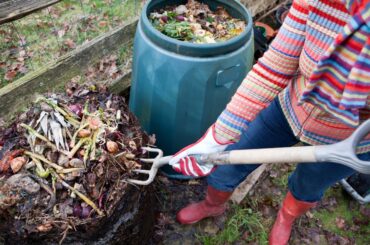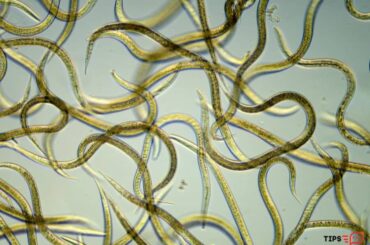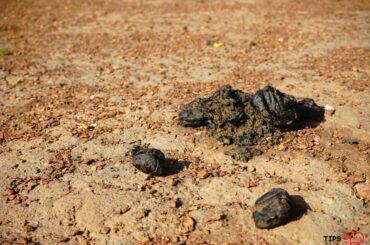If you are making compost and wondering what you should do when it “Rain on compost pile” and the precautions you need to take, I urge you to read this article.

Raining is a natural occurrence which you need to be prepared for when dealing with composting. Rainwater is an entirely pure water which does not contain any harmful chemicals or salt in it. Further it does not contain any antibacterial properties which would impact your compost as well. But rainwater is slightly acidic.
On the other hand, tap water is more alkaline and contains chemicals such as chlorine, fluoride as well. They do that to make the tap water appropriate for human consumption.
So, Rainwater does not contain any of these elements. Thus, if rainwater ends up landing in the compost bin, it would be beneficial for the microbial mechanism in the compost. That said, too much water would also turn out to be unhealthy for the compost.
Ideally you need to make the compost bin wet like a wrung-out sponge. If you wish you may mix the compost bin with a good stir as well.
You need to mix the bin before you cover it from the lid. However, if you have a vermicompost bin, chances are that it would be inundated with rainwater if you don’t monitor it well.
Advantages of rainwater on gardening activity
Rainwater has numerous benefits on gardening as well as on landscaping. Literally you could place a barrel and conserve rainwater in it. This literally means you are saving a natural resource, preventing pollution. Last but not least you could use them for irrigation purposes as well.
Should I Cover My Compost Pile?
If you are experiencing excessive rainfall, I would say best would be to cover the compost pile so that you could avoid making the compost bin waterlogged.
If there are waterlogged conditions in the compost bin, chances are that the air would get stuck in the compost pile and result in a bad air flow in it. Ultimately it would badly affect the mechanisms of the microbes in the compost bin. Ultimately it would make the compost pile stink and putrid too.

How do you recover a soggy compost mix or how to protect the compost pile from rainfall?
Compost soil becomes soggy due to several factors such as due to poor aeration, excess moisture, and imbalance of carbon rich and nitrogen rich materials. So, if you take certain steps in spring it would help you to overcome this condition.
For example, you could first consider covering the open compost pile. Keep in mind that the compost pile should be moist and not soggy.
Best would be to protect the compost pile by covering specially before the rainfall arrives in spring. If you have placed the compost pile on the ground, you need to provide sufficient drainage for the excess water to move out.
Next you could consider adding carbon materials as they would decompose rapidly. They would absorb more moisture in the compost mix and would further help to balance the carbon and nitrogen material in the compost. The right balance should be ideally one third of nitrogen to two thirds of carbon materials.
In addition to that, you could consider turning the compost to recover soggy compost. All you have to do is simply use a pitchfork or shovel to break the larger clumps of materials. It would enhance the aeration in the compost mix and speed up the composting process as well.
Besides these tips, you could also consider adding a nitrogen activator to the compost pile to treat this condition too. Ideally what you could do is take some finished compost from a stationary composter as it would speed up the composting process in the pile.
Alternatively you could use garden stop soil , blood meal manure bone meal and alfalfa meal etc. Once you adhere to these tips, you could recover a soggy compost mix.
Cover any open compost pile
Compost mix should be moist and not waterlogged or soggy. So, if you live in an area which is dry, you need to cover the compost bin if there is any prediction of a rainfall. On the other hand, if you place the compost right on the ground, you need to provide ample drainage for that.
What if get too wet
Once the compost pile receives a heavy rainfall, it would create excess moisture and waterlogged situation in the compost pile. Ultimately and other annoying animals to the compost pile. In addition to that it would make them produce harmful substances too.
Vegetable peelings, grass clippings contain high moisture components, and it would make them heavy. So, when you add these elements in excess it would also make the compost become compact, consequently it would result in a poor air flow in the compost as well.
Eventually it would create an anaerobic condition in the compost and make it favorable for harmful microorganisms to settle in the compost mix. Further they would end up producing foul smells from the compost piles too.
Once it gets too soggy, you could smell ammonia and it would be so unpleasant to inhale. In addition to aforesaid repercussions, composting in the composting piles may also be somewhat slower. Further chances are that it may even entirely stop. So, if you ever come across these signs, you need to act fast and remedy this.
How to protect your compost bin from the rainfall
I suggest you place the compost bin under a roof so that you could ignore any rainfall which could interrupt the composting process.

Related questions
How long does it take for compost to break down?
It would usually take about four week to twelve months for composting to take place completely. On the other hand, if you are using a composting tumbler, it would take about three weeks to three months for the composting to finish.
What will make compost break down faster?
I suggest you add an insulation layer to speed up the decaying of the materials in the compost pile. Further when you use insulated bins, it would also speed up the composting process.
In addition to these you may also consider adding a heat source to speed up the composting process. For example you could use either a hot water bottle or an electric heater to do this task.
Does compost need to be dry?
Compost should be ideally moist. In fact, it should consist of a moisture content of 40% to 60%. If the compost is dry, it would not decompose as a regular compost pile. If your compost pile is dry, you will not be able to spot a significant breakdown of the carbon materials.
What does unfinished compost look like?
It would tend to look like a mix of organic matters of which you could spot in bits and in pieces. For example there will be vegetable pieces, leaves etc. Literally you could identify the materials separately since the composting is unfinished.
Final thoughts : Rain on compost pile
To recap”Rain on compost pile”, you need to act smart and try to protect the compost piles from rain as it would create unnecessary issues for the composting process. So I hope that now you are well aware of the repercussions it may bring and how to overcome this condition as well.
Read Next : Cow Manure As Fertilizer : Super Fertilizer





